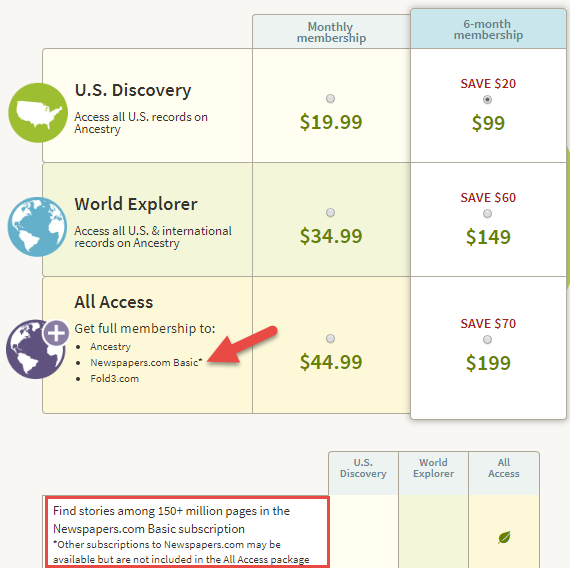DNA and Privacy: No Man is a Genetic Island
The recent identification of the Golden State Killer through a DNA database for genealogy is just one way your DNA may be used in unexpected ways. Lisa Louise Cooke shares 5 key principles to keep in mind when considering your online DNA presence. Golden State...A Shocking Family Secret and 3 Powerful Newspaper Search Tips
I used the British Newspaper Archive to make a shocking discovery in my husband’s family history was made with the help of these three powerful strategies. Read on to learn how to find more information on your ancestors in online historical newspapers. (This British Newspaper Archive link is an affiliate link and we will be financially compensated if you make a purchase. This helps support our free content like this. Thank you.)

The Research Question
Ever since I first started researching the family of my husband’s grandfather Raymond Harry Cooke, I have been aware that his mother, Mary Ann Susannah Cooke (maiden name Munns), died at a young age, around 40 years old.
What I didn’t know was how she died.
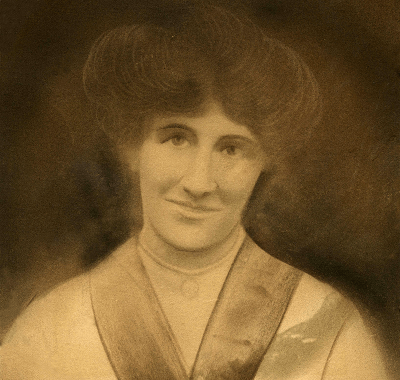
Mary Ann Susannah Cooke
In fact, Mary Ann Susannah Cooke has been one of the most elusive recent direct ancestors I’ve pursued. Up until about a decade ago we had never seen her face.
The image of Mary Ann (above) came to us through one of Bill’s first cousins. I had tracked her down in hopes of learning more about their shared grandfather, Raymond. Once we met I was thrilled to discover that Raymond had lived with her until his death at the age of 93 in 1987.
The cousin brought with her a dusty old box of his belongings. Inside we discovered the first and only known image of Mary Ann. (Genealogy Gems Premium members can learn more about this discovery and the methodology used to find the long-lost distant cousin in the Premium video class 9 Strategies You Need to Find Living Relatives.)
On the back of this cardstock image were notes written in Raymond’s own hand. The handwriting leads me to believe he may have added the notes later in life. This meant that I needed to be especially careful as I analyzed the information as it was likely from childhood memory.
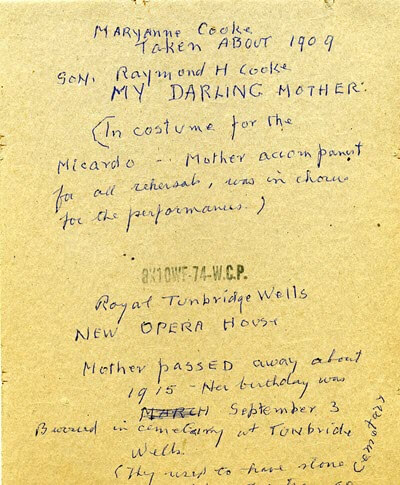
As you can see on the back of the image, Raymond states that Mary Ann died about 1915, and that her birthday was September 3. The birthday was close but incorrect. The actual recorded birth date was September 6.
The date of death was much farther off. Death records from the county of Kent show that Maryann was buried August 20, 1908, a full seven years earlier than Raymond remembered.
It’s not a surprise that his dates were off the mark. Raymond was just 14 years old when Mary Ann died. But the question remained: how did she die?
The Search
About five years ago, after writing a blog post about the British Newspaper Archive, I decided to do some digging in historic newspapers to see if I could find anything about Mary Ann’s death in Tunbridge Wells, England in 1908. With a search of Mary Ann Cooke in the website’s powerful advanced search engine I located the answer within minutes. It was devastating.
The Courier, August 31, 1908:
“Tunbridge Wells Woman’s Sad Death: Drowned in a Water Tank. The Inquest.”
“Mr. Thos. Buss, district coroner, held an inquest at the Town Hall, Tunbridge Wells, on Saturday morning, touching the death of Mary Ann Cooke, aged 41 years, whose body was found in a tank at the roof of her house, 49 Kirkdale road, the previous day.”
Suffering from prolonged depression, Mary Ann had drowned herself upstairs in the family home’s water tank. The newspaper provided a blow-by-blow of the coroner’s inquest, and the heart-breaking testimony of her husband, Harry.
And then came the final shock: Harry and Mary Ann’s 14 year old son Raymond had discovered the body.
After absorbing the story of Mary Ann’s untimely death, I was keen to see if I could learn more about the family. This is where some very powerful search strategies came into play and helped me find MUCH more in the British Newspaper Archive.
3 Powerful Newspaper Search Tips
1. Look for Search Clues in the Articles You Find
Finding an historic article on your ancestors can feel like the end of the research road. But actually, it’s just the beginning!
Go through the article with a fine tooth comb. Make note of every http://laparkan.com/buy-sildenafil/unique detail that could possibly be used in an additional newspaper database search. Here’s a list of what I found in the article about Mary Ann’s inquest. In the following steps I’ll show you how we put some of these into action.
Addresses – The Cooke’s address of 49 Kirkdale Road in Tunbridge Wells, was mentioned twice within the first two sentences of the article.
Name variations – I’m not talking about a variation in spelling, although those are certainly worth noting. In the case of newspaper research I’m referring to the varying ways that people are referred to in the newspaper. In the inquest article, Mary Ann Cooke was also referred to as “Mrs. Cooke.” This got me thinking about other ways that Mary Ann might be referred to, such as Mrs. Mary Ann Cooke, Mrs. M. A. Cooke, etc. In England, a boy Raymond’s age might be referred to as “Master Cooke.” Write down all variations you find, and then continue your list by adding the additional possibilities you can think of.
Neighbors – Mrs. Pout played a vital role on the day of Mary Ann’s death, and she served as a witness at the inquest. This was the first I had heard of her, and her name definitely made it onto my list of “searchables.”
Friends and Acquaintances – The names of Donald Thurkill (an employee of Mary Ann’s husband Harry), and the various doctors (Dr. Abbott, Dr. Grace, and Dr. Nield) were among the names I noted.
Occupations – Harry Cooke is described as a “coach builder.” Future searches of “coach builder” and “Cooke” together could prove fruitful in the future.
After assembling a comprehensive list of additional searchable words and phrases, I headed back to the British Newspaper Archive to search those leads.
2. Look Beyond Known Names
All of the naming variations I made note of in step number one could now be put to work. But before doing so, I realized that each option I came up with could actually be searched in two ways: Cooke with an “e” and Cook without an “e”. And I knew it was worth doing, because unfortunately my own name is misspelled in print on a regular basis.
Searching both “Mrs. Cooke” and “Mrs. Cook” resulted in even more articles. And in the article about “Mrs. Cooke,” Raymond was referred to as “Master Cooke.” Indeed, even more articles existed under that name as well. In the following example, I found Raymond’s name displayed three different ways!
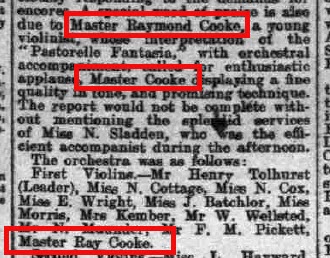
3. Go Beyond People
While finding your ancestor’s name in print in the newspaper is exciting, don’t underestimate the power of searching for other bits of information. Searching for addresses where they lived can put you in the middle of a wealth of new information about your family.
It isn’t necessary to include the surname of your family. In fact, I highly recommend that you don’t. The property where they lived has a history of it’s own. Simply searching the address can give you a kind of “house history” set of search results. These articles can potentially reveal who lived there before your family, descriptions of the home and its contents, and who your family sold the property to. In both the buying and selling of the property there is the potential to learn more about your family and possible further connections to others in the transactions.
In my case, I located an article about the Cooke home by searching the address 49 Kirkdale Road.
In the search results I discovered an article about the home being put up for sale several years before the Cooke family owned it. It was interesting to note that the previous owner had also been a coach builder, so it was a logical purchase for Harry Cooke when he decided to start up a coach building and horseless carriage mechanic shop of his own.
The final article I found in the British newspapers was also found only by address. The Cooke name was never mentioned, but indeed it did provide the slightest mention of the family: “Owner going abroad.” This article advertised the family home being put up for sale in 1912 in anticipation of their emigration.
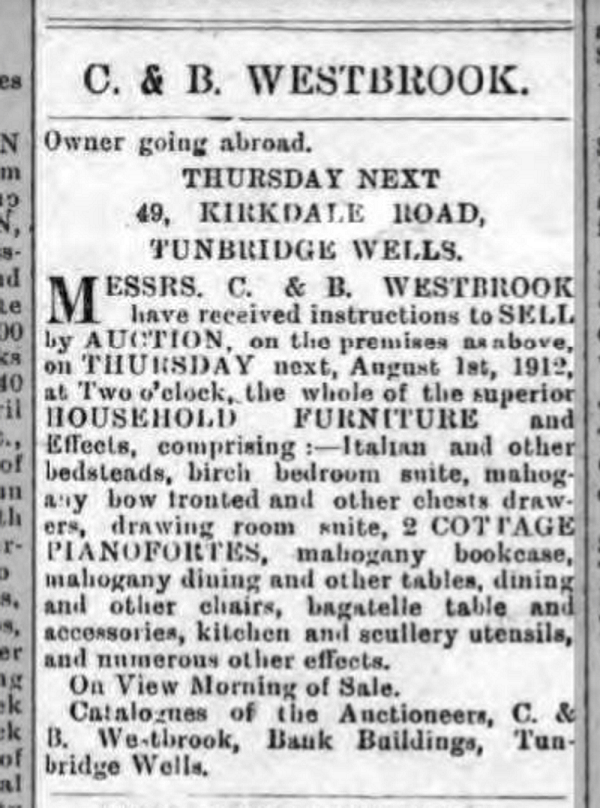
I admit I got a lump in my throat as I read of Mary Ann’s beloved pianofortes being sold. She was a skilled and talented musician who often played violin at the Tunbridge Wells Opera House and at garden parties around the countryside, and clearly she enjoyed playing the piano at home as she owned not one, but two “pianofortes.”
With the description of the inside of the home in the inquest article, the outside of the home in the “house for sale” newspaper advertisement that Harry first responded to, and now this article describing their possessions as they prepare to move to Canada, my newspaper research painted a much more complete picture of the Cooke’s life in Tunbridge Wells, England.
You can hear more about my search for Mary Ann’s story in the free Genealogy Gems Podcast episode #174.
More Resources from Genealogy Gems:
I’ve written additional article here at Genealogy Gems that I think you will benefit from and enjoy:
- 5 Most Popular Historical Newspaper Searches–and How to Improve Yours
- Can Google Help Me Search Digitized Newspaper Pages?
And if you’re a Genealogy Gems Premium member you have access to my video class Getting the Scoop on Your Ancestors in Newspapers.
If you’re not yet a member, you can learn more here.
Did these tips help you find your ancestors in old newspapers? Please leave a comment below. We all learn from hearing each other’s successes!
Why Google Bought YouTube–And Why That’s Good for Genealogy!
Using YouTube for genealogy can be so effective partly because of who owns YouTube: Google!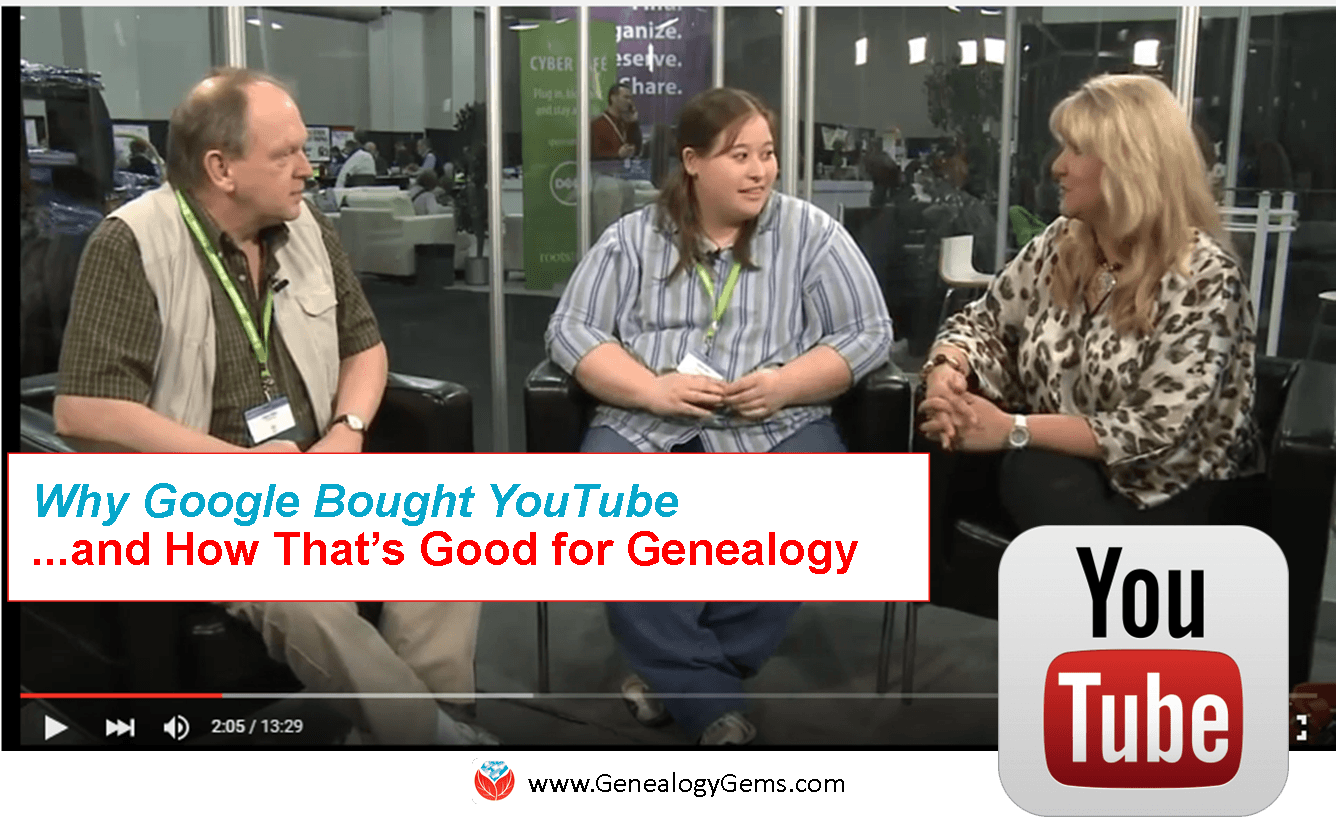
In 2006, Google acquired YouTube, a video-sharing website, not long after it was launched. Ten years later, YouTube claims the attention of a billion people around the world: a third of all internet users. At last count, more than 300 hours of video footage are uploaded every minute to the site.
Why should genealogists care? For the same reason Susan Wojcicki wanted to buy YouTube. She was supervising Google Video acquisitions at the time of the purchase and is now the CEO of YouTube. According to this article, she watched the video shown below of teenage boys lip-syncing to a famous boy band. She doesn’t admit whether she enjoyed their groove, but she did say, “That was the video that made me realize that ‘Wow, people all over the world can create content, and they don’t need to be in a studio.'” Check it out–then keep reading.
Yes, YouTube makes it possible for anyone to share videos of all kinds, including genealogy-friendly content like:
- Original footage of events all the way back to the invention of the movie camera.
- Family history documentaries created by users that may include your family.
- Instructional videos that will help you become a better researcher, create a family heirloom, or learn the latest genealogy software.
- Video tours of archives, libraries, and other repositories that will help you prepare for and get the most out of your visit.
- Interviews with genealogy experts and vendors.
- Entertaining videos that add enjoyment to one of the world’s most popular hobbies.
- Your family in other family’s home movies.
EVEN BETTER, Google’s acquisition of YouTube means you can use the same powerful search methodologies you use for Google searches to find 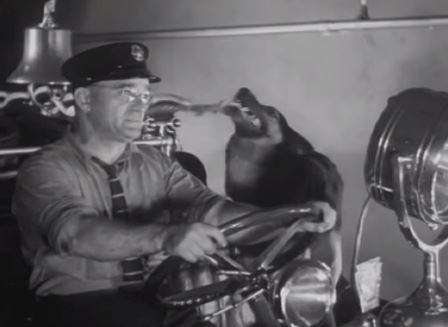 YouTube content you want.
YouTube content you want.
Gems Contributing Editor Sunny Morton didn’t really believe me when she read the YouTube chapter in my book, The Genealogist’s Google Toolbox. Then she tried it. She discovered a 1937 film news reel showing her husband’s great-grandfather driving his fire engine! (Click here to read about her discovery and about how she’ll never doubt me again, ha ha!)
Why not take five minutes now to see what YOU can find on YouTube for genealogy?
1. Look again at the list above or click here to read more details about family history content on YouTube. Choose a family line, location, brick wall, display or craft idea to search for.
2. 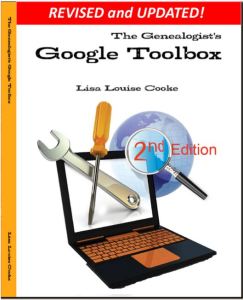 Go to YouTube’s home page. Enter a few Google search terms on the topic you hope to find.
Go to YouTube’s home page. Enter a few Google search terms on the topic you hope to find.
3. Browse results. If you don’t find anything useful, widen your search or come at it from a different angle.
4. Try additional topics. Certainly DON’T give up after one search! Sunny’s discovery was made on her second topic–less than five minutes after trying a first topic and realizing she didn’t know enough about that family to recognize their lives in the cool footage she was finding. Instead, she searched YouTube for a man she knew a lot about-enough to recognize him in a video that didn’t name him.
To learn more in-depth how to use YouTube for genealogy, I invite you to read my book, The Genealogist’s Google Toolbox. The YouTube chapter helped Sunny find amazing family footage in less than five minutes–see what it can do for you!
More YouTube for genealogy gems
My Most Amazing Find EVER: Family History on YouTube (No Kidding!)
YouTube Video: How to Use a Microfilm or Microfiche Reader
10 Top Tips for Busting Through Your Genealogy Brick Wall: Live Interview
Comparing Digitized Newspapers on Genealogy Websites: Why Findmypast.com Gets a Headline
When it comes to digitized newspapers on genealogy websites, Findmypast is a clear headliner. The site already hosts millions of U.S., British, and Irish newspaper pages–and their British collection is about to DOUBLE. Extra, extra, read all about it!
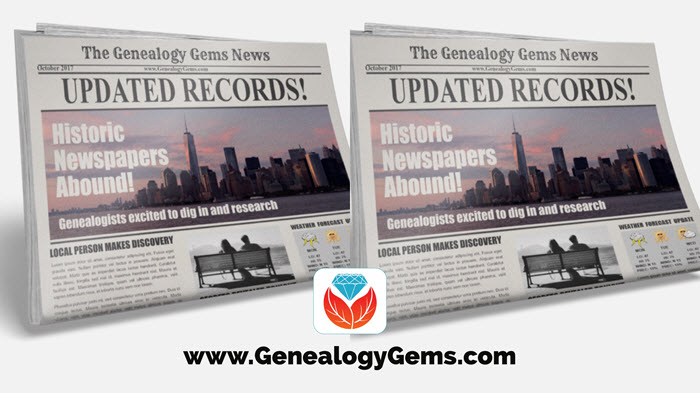
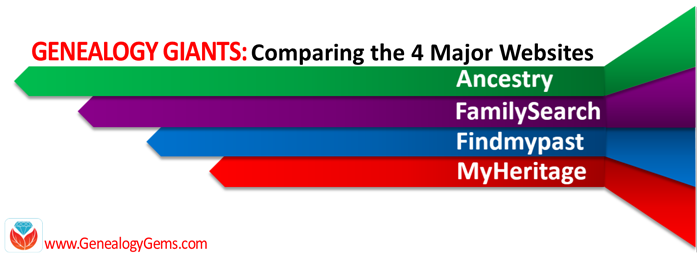 Here at Genealogy Gems, we regularly compare features of leading genealogy websites, or as we refer to them, the “Genealogy Giants:” Ancestry.com, FamilySearch, Findmypast and MyHeritage. Today’s topic: digitized newspapers.
Here at Genealogy Gems, we regularly compare features of leading genealogy websites, or as we refer to them, the “Genealogy Giants:” Ancestry.com, FamilySearch, Findmypast and MyHeritage. Today’s topic: digitized newspapers.
It may surprise you to hear that digitized historical newspapers aren’t a big part of the collections at all four giant genealogy websites. In fact, only one site–Findmypast–offers access to millions of exclusive British and Irish newspaper pages and a major U.S. newspaper database (which is usually just available at libraries).
Why mention it now? Because a good thing just got better: Findmypast plans to double its British newspaper content over the next two years.
Digitized Newspaper Treasures at Findmypast.com
 Findmypast’s enormous genealogy collections focus on the countries of England, Scotland, Ireland, and Wales. Findmypast and The British Library have been working together for several years on The British Newspaper Archive, now home to more than 22.5 million newspaper pages dating from the 1700s. But what many people might not realize is that these same newspaper pages are also available to Findmypast subscribers.
Findmypast’s enormous genealogy collections focus on the countries of England, Scotland, Ireland, and Wales. Findmypast and The British Library have been working together for several years on The British Newspaper Archive, now home to more than 22.5 million newspaper pages dating from the 1700s. But what many people might not realize is that these same newspaper pages are also available to Findmypast subscribers.
You can search newspaper pages on Findmypast by name (first and last) and by other keywords, such as an occupation, street address, event or another word that might be associated with your family in newspaper articles. You can narrow the date range of papers searched and even target specific newspapers:
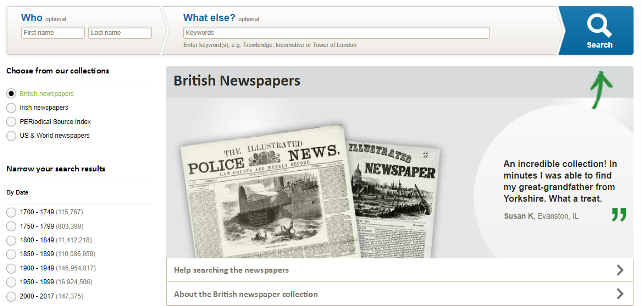
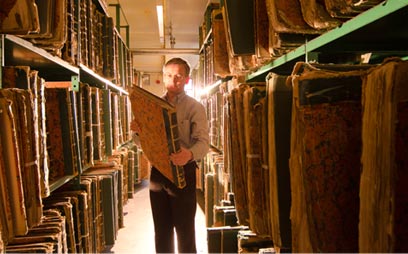
Original bound newspaper volumes at the British Library. Image from The British Newspaper Archive.
And it gets better. Findmypast just announced that over the next two years, it will nearly double its digitized newspaper collections! It is scanning over 12 million pages from the largest private newspaper collection in the UK: the Trinity Mirror archives. Over 150 local papers from across the U.K. are included. These pages have never been made available online, but will be on both The British Newspaper Archive and Findmypast. The project is already underway and moving along rapidly: up to 100,000 pages per week.
According to a press release, “The program builds on an existing partnership that has already resulted in the digitization and online publication of upwards of 160 Trinity Mirror titles, including significant coverage of both World Wars. Published online for the very first time, these war-time publications also included the Archive’s first national titles, The Daily Mirror and The Daily Herald.”
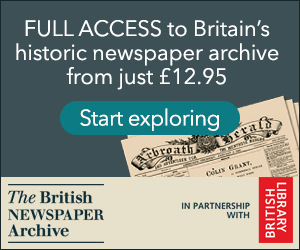 TIP: If you are interested in accessing British newspapers, but not needing the full range of genealogy resources offered at Findmypast, consider purchasing PayAsYouGo credits from Findmypast. You can purchase 60-900 at a time and “spend” them to view individual search results, including newspapers. You can also subscribe separately to The British Newspaper Archive.
TIP: If you are interested in accessing British newspapers, but not needing the full range of genealogy resources offered at Findmypast, consider purchasing PayAsYouGo credits from Findmypast. You can purchase 60-900 at a time and “spend” them to view individual search results, including newspapers. You can also subscribe separately to The British Newspaper Archive.
More Digitized Newspapers on Genealogy Websites
The other giant genealogy websites do offer some newspaper content–indexed, imaged, or both. Here’s a short summary of what you’ll find on Ancestry.com, FamilySearch, and MyHeritage:
Ancestry.com: This giant site does offer some digitized newspaper content, including images connected to indexed names in Historical [U.S.] Newspapers, Birth, Marriage, & Death Announcements, 1851-2003, Australia’s New South Wales Government Gazettes, 1853-1899 and Canada’s Ottawa Journal (Birth, Marriage and Death Notices), 1885-1980. But Ancestry.com’s biggest newspaper collections are mostly indexed obituaries (not images of the actual newspaper pages). Ancestry.com subscribers who want major access to digitized newspapers should consider upping their subscription to “All Access,” which includes Basic access to Newspapers.com.
FamilySearch: Millions of indexed obituaries are searchable by name on its free website, but it doesn’t generally offer any digitized newspaper pages. Of its billion+ historical record images, FamilySearch prioritizes more “core” genealogical records, such as vital records, censuses, and passenger lists.
MyHeritage.com: This site used to have access to NewspaperARCHIVE, the same U.S. newspaper database Findmypast currently offers, but it doesn’t now. It’s got new collections of Ohio (4.5 million pages from 88 sources) and New York (1.9 million pages from 56 sources) newspapers and access to the Jewish Chronicle [England]. But the bulk of its newspaper search results come from searching two other websites: Chronicling America and Trove, run by the national libraries of the United States and Australia, respectively. While it’s convenient to search them from MyHeritage if you are already using it, it’s not a reason to subscribe, as you can use those sites for free.
More Inside Tips on the Genealogy Giants
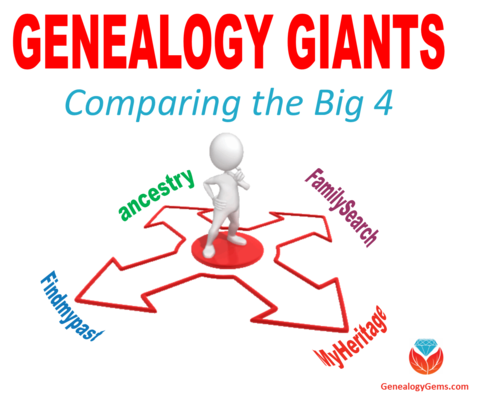 Genealogy Gems is your home for ongoing coverage and insight into the four ‘genealogy giants’ websites. Click here to learn more and to watch the RootsTech 2017 world premiere of my popular lecture that puts these big sites head-to-head. Genealogy Gems has published my ultimate quick reference guide, “Genealogy Giants: Comparing the 4 Major Websites.” It distills that hour-long lecture (and I was talking fast!) into a concise, easy-to-read format that will help you know which websites are best for you to use right now.
Genealogy Gems is your home for ongoing coverage and insight into the four ‘genealogy giants’ websites. Click here to learn more and to watch the RootsTech 2017 world premiere of my popular lecture that puts these big sites head-to-head. Genealogy Gems has published my ultimate quick reference guide, “Genealogy Giants: Comparing the 4 Major Websites.” It distills that hour-long lecture (and I was talking fast!) into a concise, easy-to-read format that will help you know which websites are best for you to use right now.
Disclosure: This article contains affiliate links and Genealogy Gems will be compensated if you make a purchase after clicking on these links (at no additional cost to you). Thank you for supporting the free Genealogy Gems podcast and blog!


